
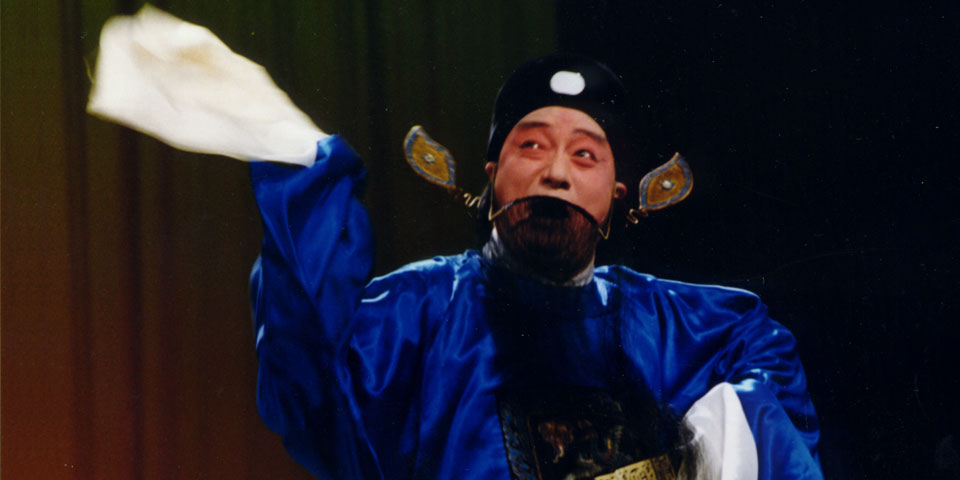
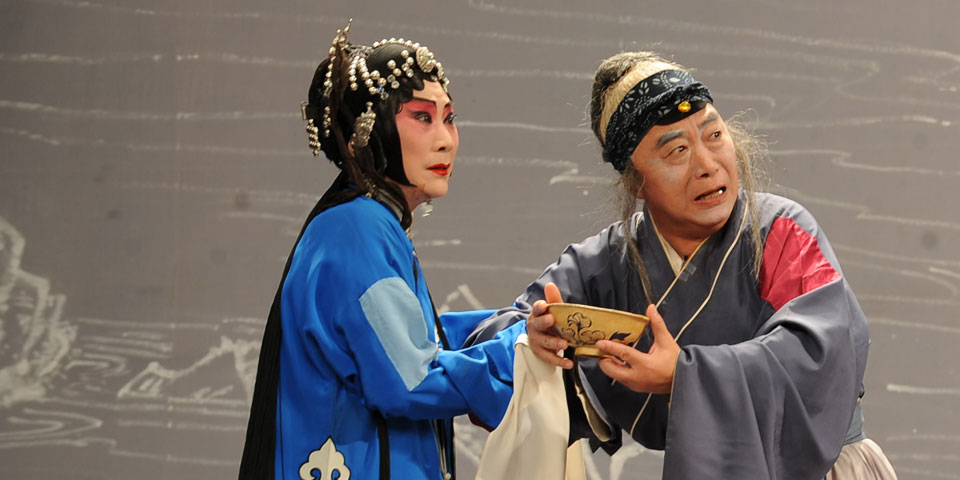
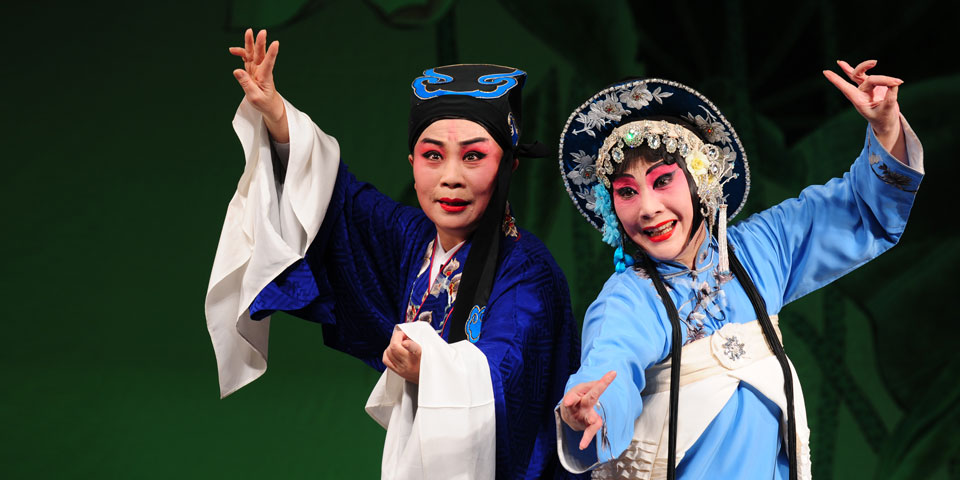
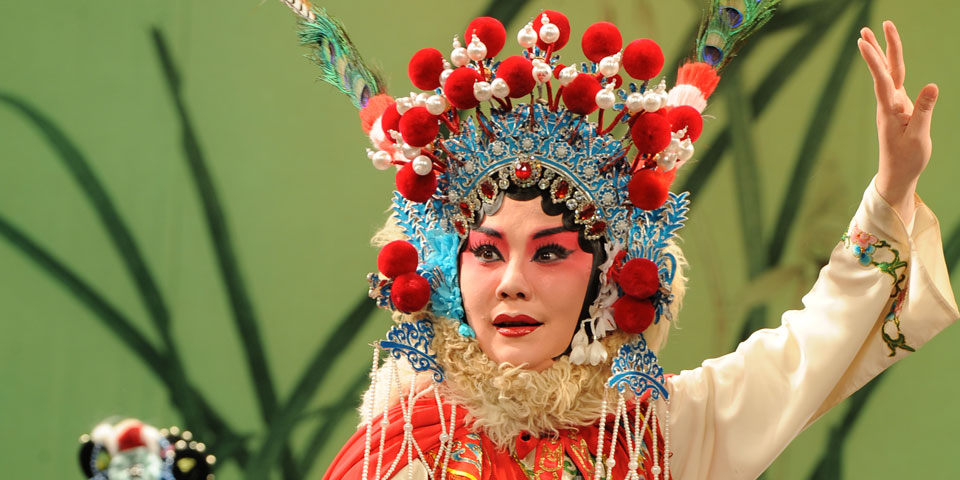
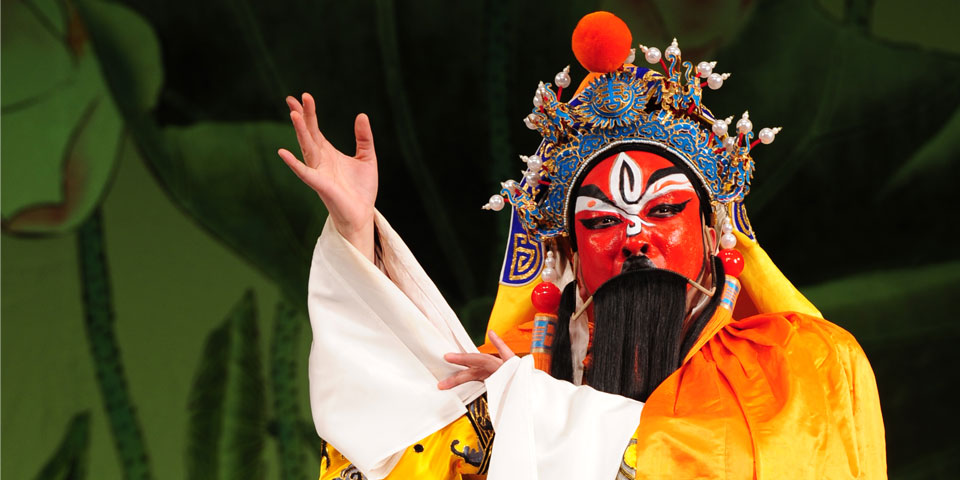
Shanghai Kunqu Opera Troupe
Zhang Mingrong
Famous kunqu artist, National Class One Performer, graduate of Shanghai Municipal Chinese Opera Institute specializing in wuchou (martial clown role). In the Institute he studied under kunqu masters Zhou Chuancan, Hua Chuanhao, Wang Chuansong and the Peking Opera master Gai Chunlai. After graduation he often consults famous Peking Opera clown role performers including Ai Shiju and Zhang Chunhua about his acting skills. He also works as kunqu director. He has learnt numerous traditional pieces and is popular with both national and international audience. He has received the 1st China Kunqu Opera Arts Festival Honor Award for Performance and the 4th China Kunqu Opera Arts Festival Special Honorary Award. He has also been given the title Kunqu Outstanding (Director) Principal Creative Personnel.
Yue Meiti
Famous kunqu artist, specializing in xiaosheng (civil male role), National Class One Performer, graduate of Shanghai Municipal Chinese Opera Institute. Yue has studied under kunqu masters including Yu Zhenfei, Chen Chuanzhi, Zhu Chuanming and Zhou Chuanying. Her most popular roles are the principal male characters Pan Bizheng in The Jade Hairpin and Liu Mengmei in Peony Pavilion. She has received numerous awards including the 4th Plum Blossom Award for Chinese Theatre, Performing Award of the Wenhua Award, the Star Award at the 4th and 8th Bai Yulan Performing Arts Awards for Shanghai Theatre, the Honour Award for Performance at the 1st China Kunqu Opera Arts Festival, the Performing Award at the Shanghai Theatre Festival.
Liang Guyin
Famous kunqu artist, National Class One Performer, graduate of Shanghai Municipal Chinese Opera Institute. Liang has studied under kunqu masters including Zhang Chuanfang, Zhu Chuanming and Shen Chuanzhi. She specialises in huadan (lively female role), but also acts in zhengdan (principal female roles) and guimendan (domestic female role). She has an extensive repertoire and is famed as a ‘comprehensive talent’ of kunqu. She has created many acclaimed characters of a wide range of personalities. She has received numerous awards including the 3rd Plum Blossom Award for Chinese Theatre, the Star Award at the 1st and 5th Bai Yulan Performing Arts Award for Shanghai Theatre and the Performing Award of the 12th Wenhua Award.
Cai Zhengren
Famous kunqu artist, National Class One Performer, graduate of Shanghai Municipal Chinese Opera Institute. Cai also served as Director of Shanghai Kunqu Opera Troupe. He has studied under kunqu masters including Yu Zhenfei, Shen Chuanzhi and Zhou Chuanying. He specialises in the xiaosheng and excels especially on guansheng (hatted male roles), although he is also skillful in portraying qiongsheng (male role in poverty). He has received numerous awards including the 4th Plum Blossom Award for Chinese Theatre, the Leading Performer Award at the 5th Bai Yulan Performing Arts Awards for Shanghai Theatre, the Baogang Beaux Arts Award for and the Honor Award for Performance at the 1st China Kunqu Opera Arts Festival, and the Special Honorary Award at the 4th China Kunqu Opera Arts Festival.
Gu Haohao
National Class One Performer, graduate of Shanghai Municipal Chinese Opera Institute 3rd Kunqu Acting Class. She subsequently studied in and took art related professional qualifications from Shanghai University and Shanghai Theatre Academy. She specialises in wudan (martial female role) and the daomadan (sword and steed female role). She has studied under kunqu artist Wang Zhiquan and has received numerous awards including the 23rd Plum Blossom Award for Chinese Theatre, the Artistic Award for Promoting Kunqu Opera, Red Plum Award, the 4th China Kunqu Opera Arts Festival Outstanding Performing Award.
Miao Bin
National Class One Performer, graduate of Shanghai 5-7 Jingju Training Class. Upon graduation he joined Shanghai Peking Opera Theatre. He has studied under veteran performers including Zhang Wenjuan, Zhi Shigong, Ma Baogang and Chen Hongsheng. In 1980 he took lessons from the Yu school laosheng player Chen Dahuo. Later he has transferred to Shanghai Kunqu Opera Troupe. His portrayal of Bai Juyi in Journey with a Lute won him the 7th China Theatre Acting Award.
Wu Shuang
National Class One Performer. Wu is a graduate of Shanghai Municipal Chinese Opera Institute and East China Normal University. He specialises in the jing (painted face role) and has studied under kunqu artists Fang Yang, Zhong Weide and Wang Qun. He received the Kunqu Promotion Award in the National Kunqu Opera Outstanding Middle-aged and Young Performers Showcase, the National Kunqu Opera Outstanding Young Performers Showcase 10-Outstandings Performer Award and the Performing Award of the 12th Wenhua Award.
Li An
National Class One Performer. Li is a graduate of the Shanghai Municipal Chinese Opera Institute and the Shanghai Theatre Academy. He specialises on xiaosheng and has studied under kunqu artists including Yue Meiti, Cai Zhengren and Zhou Zhigang. He received the Leading Performer Award at the 15th Bai Yulan Performing Arts Award for Shanghai Theatre, and ranked top consecutively in the 4th and the 5th China Kunqu Opera Art Festival Outstanding Performing Award.
Yuan Guoliang
National Class One Performer, graduate of Jiangsu Province Suzhou City Pingtan Institute Kunqu Acting Class, and Shanghai Theatre Academy. He specialises in the laosheng, and has studied under kunqu artists Ji Zhenhua and Lu Yongchang and the Peking Opera Qi school laosheng artist Zhang Xinzhong. He received the 1st China Kunqu Opera Arts Festival Performing Award and the 4th China Kunqu Opera Arts Festival Outstanding Young Performer Acting Award.
Yu Bin
National Class One Performer, graduate of Shanghai Municipal Chinese Opera Institute and Shanghai Theatre Academy. At the Institute she studied under Wang Yingzi and Zhu Xiaoyu, subsequently under kunqu artists Zhang Jingxian, Zhang Xunpeng and Liang Guyin since she has joined the Shanghai Kunqu Opera Troupe. She specialises in guimendan and zhengdan. She received the 2nd Chinese Opera Singing Red Plum Competition Gold Award and the 4th China Kunqu Opera Arts Festival Outstanding Performing Award.
|
|
|||||||||||||||
| • With Chinese and English surtitles. • Please refer to the ‘Extension Activities’ page for details of other extension activities. • Each performance lasts approx. 2 hours and 45 minutes with a 15-minute intermission. |
||||||||||||||||
Click here to download the transcript.





